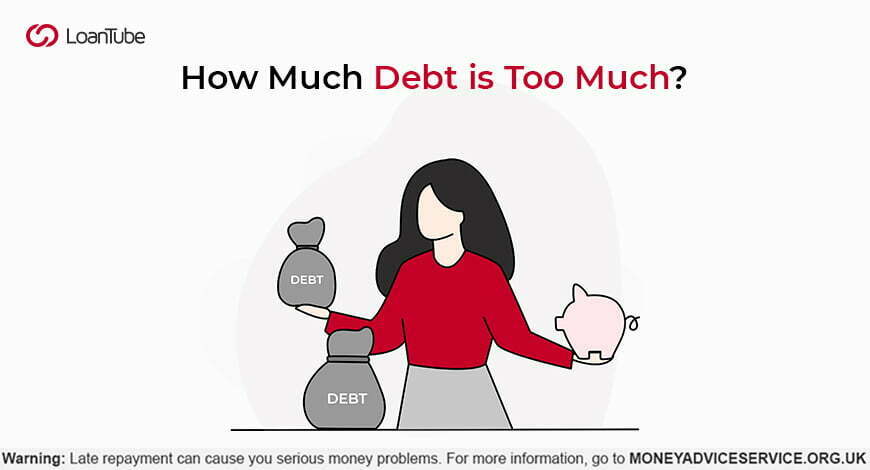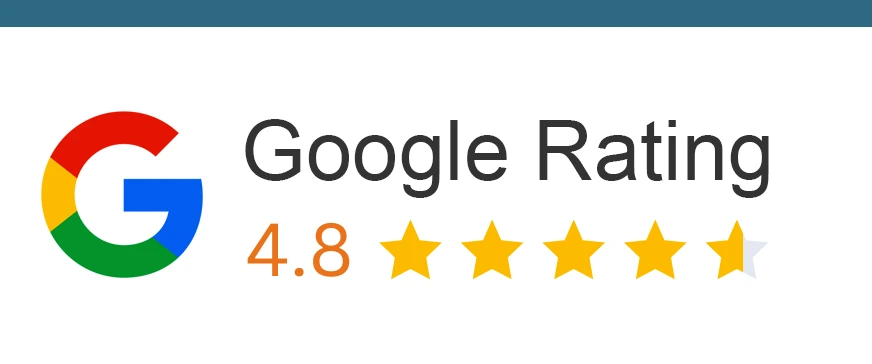Debt is a necessary evil of our financial life cycle. It can help you fulfil essential milestones of life such as building an asset – your house. But the same debt can cause you mental distress by disturbing your financial peace. What separates good debt from bad debt is a healthy debt-to-income (DTI) ratio.
Read on to find out if you’re dealing with an overwhelming amount of debt. Learn the difference between good, bad and toxic debt.
As long as you resolve to solve your money woes, there’s a way out of the debt pile.
- How much debt is too much?
- Is debt always bad?
- Can my other types of debts cause problems?
- Do I have too much debt to deal with?
Maximise your options: Compare and apply for loans below with LoanTube
Apply Filters
How much debt is too much?
Regardless of whether the debt is good or bad, you ideally want it to be as low as possible. It is vital to balance your liabilities and income to stay financially flexible for emergencies and life goals.
If you’ve reached a stage where you’re struggling to keep up with your loan’s repayments, you’ve likely hit debt saturation. It is recommended that you maintain a debt-to-income ratio of less than 43%. Anything above 43% is a sign that you’re dealing with a financial crisis.
Use our debt calculator to find out how problematic your debt is.
- DTI<36%: A debt-to-income ratio that’s less than 36% indicates that your debt is affordable compared to your income.
- 42%>DTI>36%: Things aren’t still out of hand. You can use some DIY techniques to defuse your debt – debt avalanche or debt snowball. You can choose to pay off the highest or lowest interest debts first, respectively. An unsecured personal loan taken to consolidate debt can help you combine them into a single loan.
Find Your Ideal Debt Consolidation Loan
- 50%>DTI>43%: If you’re DTI is above 43%, the chances are that you’re overwhelmed with repayments. You should consider professional help from a not-for-profit credit counselling agency. Denying your financial problems may worsen the situation. It is best if you act on it.
While these guidelines are a more generalized thumb-rule, know that one size doesn’t fit all in financial planning. Devise a debt management strategy that suits you best and take action accordingly.
Is debt always bad?
Now that you have some clarity on your debt-to-income ratio, the next step is to understand the kind of debts you’re dealing with. A good way to start is by separating the good, bad and toxic debt.
- Good debt
Debt isn’t always bad. A loan with a low, fixed interest rate that you borrow to build or invest in an appreciating asset, such as your house or business, is good debt. What’s even better is a mortgage or student loan whose interest is tax-deductible.
- Bad debt
When you borrow a high-interest loan to finance the purchase of a depreciating product, a high APR credit card debt with an increasing balance, for instance, may be affecting your financial wellbeing. A loan or credit, if used responsibly, can help you spread the cost of your purchase into affordable instalments. But taking on more debt than you can handle can put your finances at risk.
- Toxic debt
If you live or have lived from payday to payday, the thought of getting a payday loan must’ve crossed your mind at some point. Some of us did end up falling into the trap of this high-cost short-term credit. Payday lenders use the no-credit-check marketing gimmick to attract vulnerable customers and then impose exorbitant interest rates. The APRs can exceed 36%, and you end up paying way more than the item’s worth. Pawnshops that require collateral you can’t afford to lose, such as your car, also exemplify toxic debt.
A mortgage borrowed at 3.5% APR and a credit card with a 26% APR, for instance, can be weighed differently. When you accumulate bad debt with sky-high interest rates, it impacts your cash flow, limits your savings and hampers your ability to borrow credit to reach important milestones in life.
Can my other types of debts cause problems?
Here’s an idea of how much debt is too much in the following categories and what you can do if you’re overwhelmed with payments:
- Auto Loans
The recommended total for your auto loan costs, inclusive of car payments, should not exceed 20% of your take-home pay. The length of your loan term should ideally be four years or less, along with a 20% down payment. Keep your loan term short will ensure that you don’t pay more than what the vehicle is worth. If you choose a longer-term, you’re only piling on more interest.
The solution: Financial circumstances can change. If you find it challenging to keep up with your auto loan, consider refinancing it or switching to a less expensive car.
- Housing
Buying your first house is probably one of the biggest life goals. Your mortgage should ideally not exceed 36% of your income.
The solution: If you’ve been sincerely repaying towards your loan obligations, the chances are that your credit score would have improved over time. You may now be eligible for better interest rates on your mortgage. In such a case, mortgage refinancing could help you replace your existing mortgage with a better one – better in terms of interest and repayment period. Another way is to downsize or move to a less expensive area.
In case you plan to move to a new place or refinance your mortgage in your 40s or 50s, consider a 15-20 year mortgage plan. This will allow you to pay off your debt by the time you retire.
- Medical Expenses
Medical expenses are often unforeseen and beyond our control. In many cases, this debt may be interest-free, but some costly medical procedures can break the bank, making the debt intractable.
The solution: The first and foremost step would be to address the financial crisis and negotiate with the billing office to lower the amount. If you feel that you can repay the entire bill but need more time, you can set up an affordable payment plan with them. Debt relief can be a possible solution, but you’ll be better off covering the costs on your own.
- Education Loan
Education loans can be tricky business if you lack a realistic approach towards the job market. Try not to borrow more than what you expect to earn in the first year of your employment. For instance, if you’re expecting a starting pay of £30,000, you should stick to borrowing £10,000 per year for a three-year degree. Over-borrowing doesn’t pinch you at the time of borrowing but disturbs your financial equilibrium once you start earning and saving. Besides, the sooner you pay off your education loan, the sooner you will be able to fulfil subsequent life goals.
- The solution: You can go for an income-driven payment plan which will give you some repayment flexibility. These plans depend on the borrower’s income rather than the loan amount owed. Explore your repayment options and choose one
How to handle an overload: Explore your repayment options, including income-driven repayment plans and refinancing.
Do I have too much debt to deal with?
Are you struggling to keep up with your debt payments? Or, are your high-cost debt payments holding you back from accomplishing your life goals? If that’s the case, the chances are that you’re dealing with a debt overload. Even if you’re making timely repayments, a debt overload can cause financial imbalance – inability to save money, missing bill payments, or borrowing to regulate cash flow for day-to-day expenses.
Here are 5 signs to help you find out if you have more debt than you can handle:
- You don’t know how much money you owe: Living in denial or trying to escape a problem is not a long-term solution. If you’re doing it on purpose, it’ll only make things worse. We know it’s a long battle, but to win it, you must start somewhere. Pull out a copy of your credit report and recent bank statements and make a list of all the outstanding balances. Crunch the numbers to find out your total payable debt.
- You’re borrowing more to pay off your debts: If you’re struggling to stay afloat and have borrowed money from friends, family, and pawnbrokers or used a cash advance to make payments, you’ve accumulated more debt than you can handle. You’ll eventually run out of places to borrow. Plus, you’ll have to sort out the debt you’ve piled up with your family, and things could turn awry. If you’re low on income, a good way to cope with debts would be by starting a side hustle to make extra money. You could also revisit your budget and streamline it by eliminating unnecessary expenses.
- Avoiding phone calls from collectors: If you’ve been neglecting your debt for too long, you’ll eventually hear from debt collectors seeking to recover their money. You may be able to avoid their phone calls, but things can go off-course if they decide to take legal action against you. Lenders can summon you to court and get a County Court Judgment (CCJ) issued in your name. A CCJ can leave a lasting impact on your credit profile, hampering your chances of securing credit in the future. A positive approach in this situation could go a long way. Instead of dodging their phone calls, communicate your problems and devise a more affordable arrangement to repay your dues.
- You’ve exhausted all your savings: If you’ve spent all your savings while trying to settle your balances, it indicates a problem. Even if you drained your savings to make ends meet, it’s equally big a problem as using your savings to pay off debt. In either case, your circumstances may force you to take on more debt to stay afloat or to tackle an emergency. Again, try to find out ways to maximize your income or cut down miscellaneous expenditure from your budget.
- You need credit to survive: When you start using your credit card to buy household basics, that’s when you know you’re dealing with a severe financial crisis. If you lack money to sustain your basic lifestyle, that means either your earnings don’t suffice, or you’re not spending responsibly. If it’s the former, you should figure out a way to increase your income. Otherwise, address your spending issues by making a budget and strictly adhering to it.
Here’s what can help: The 28/36 rule
The 28/36 rule is a general principle that you can use to calculate a manageable debt load. Herein, a household shouldn’t spend more than 28% of their gross income on housing expenses. This figure is inclusive of mortgage payments, homeowners insurance and property tax.
And the 36% figure denotes the maximum percentage of gross income that a household should allocate to total debt service, such as auto loans and credit card debt.
For instance, if your gross annual income is £38000, as per the 28/36 rule, your housing expenses should be less than or equal to £10,640 annually or £886.67 monthly. Similarly, your debt servicing cost shouldn’t exceed 36% of your gross annual income.


